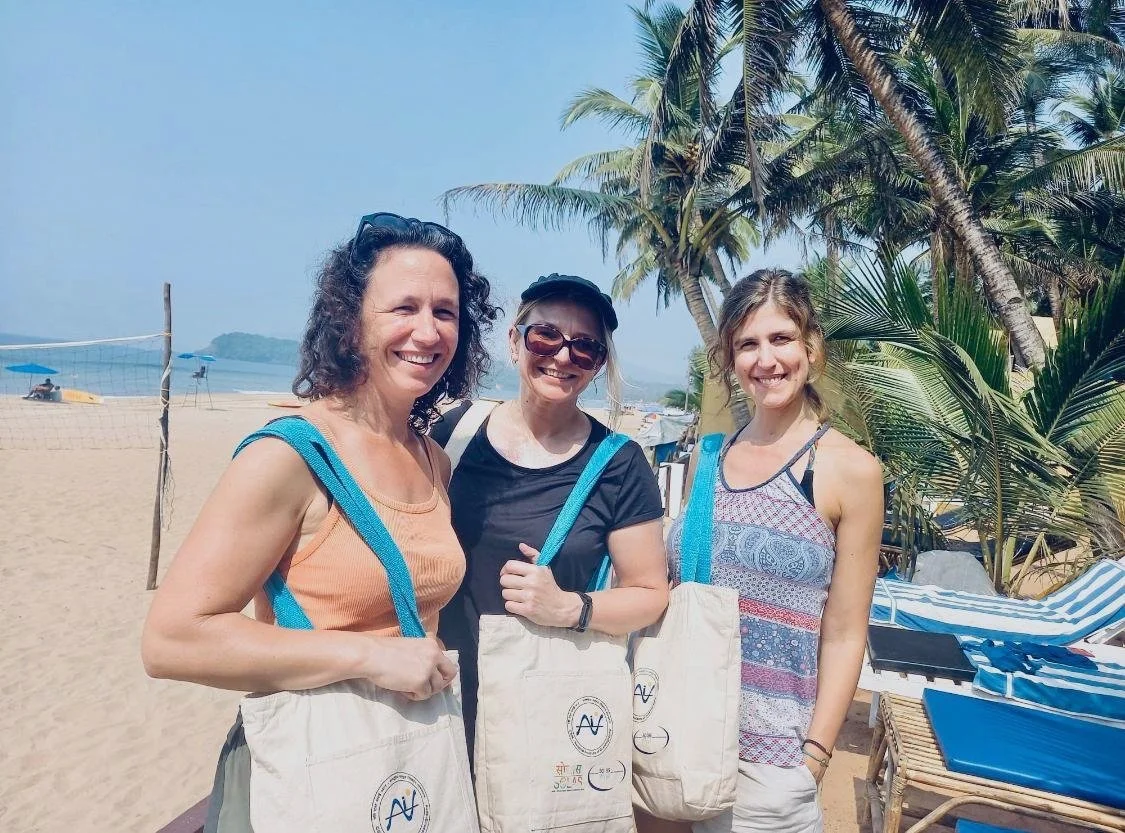It was with great pleasure that Catarina Guerreiro, coordinator of project CHASE and Portuguese national representative for SOLAS (Surface Ocean – Lower Atmosphere Study), accepted the invitation for presenting a plenary keynote on the SOLAS Core Theme “Atmospheric deposition and ocean biogeochemistry” at the 9th SOLAS Open Science Conference (OSC), hosted by the CSIR-National Institute of Oceanography, from 10-14 November, in Goa, India.
The OSC is a biennial event that brings together the oceanographic and atmospheric international communities working on SOLAS-related themes. This meeting provides the ideal platform for scientists to connect, share, and present their latest findings on cutting-edge research within the SOLAS domain welcoming and stimulating environment for scientific exchange, encouraging collaboration and innovation. Beyond the science, it was also a wonderful opportunity to reconnect with friends and collegues, meet new colleagues, and enjoying the beautiful and vibrant setting of Goa.
Researchers from all over the world that gathered together for the SOLAS OSC 2024, at the main lecture hall of CSIR-National Institute of Oceanography, in Goa, India.
SOLAS OSC Convener Ashwini Kumar and Haimanti Biswas (CSIR-National Institute of Oceanography) on the left, and SOLAS SSC Co-Chairs Christa Marandino (GEOMAR Helmholtz Centre for Ocean Research) and William Miller (University of Georgia) on the right, during the inaugural session of the conference.
The keynote speakers covered a diverse range of topics aligned with the Core Themes of the SOLAS 2015-2025 Science Plan and Organisation, each highlighting critical aspects of ocean-atmosphere interactions:
Sam Dupont (University of Gothenburg) spoke at “Greenhouse gases and the oceans”, a session focusing on the natural cycles of CO₂, CH₄, and N₂O, their interactions with anthropogenic inputs, and their climatic and environmental impacts. Shikha Singh (Indian Institute of Tropical Meteorology) spoke at “Air-sea interface and fluxes of mass and energy”, a session exploring processes like waves, bubbles, and surfactants that regulate mass and energy exchange between the ocean and atmosphere. Catarina Guerreiro (MARE and IDL, Ciências Ulisboa) spoke at “Atmospheric deposition and ocean biogeochemistry”, a session examining how atmospheric particles of natural and anthropogenic origin affect marine ecosystems and biogeochemical cycles. Manuela van Pinxteren (Leibniz Institute for Tropospheric Research) presented at “Interconnections between marine ecosystems, aerosols, and clouds”, a session emphasizing the integrated system formed by these elements. And Yee Jun Tham (Hong Kong Polytechnic University) presented at “Ocean biogeochemical control on atmospheric chemistry”, a session focusing on ocean-emitted aerosols and gases, their effects on atmospheric photochemistry, air quality, and stratospheric ozone.
Additional sessions included one focused on high-priority systems like upwelling regions, polar oceans, and the Indian Ocean, and another on “SOLAS Science and Society” highlighting research with societal relevance, such as impacts on air quality, human health, marine resources, and climate regulation.
Doug Wallace (CERC Laureate and Canada Research Chair in Ocean Science and Technology at Dalhousie University) was the keynote speaker of the session “Climate Intervention”, presenting on the trade-offs of implementing carbon dioxide removal (CDR) approaches like, for instance, ocean alkalinity enhacement.
Schematic reopresentation of the five SOLAS Core Themes (more information here).
During her keynote presentation on “Aeolian dust deposition in the ocean: a calcifying phytoplankton perspective”, Catarina shared a synthesis of all the work that she led as an Early Career researcher (2013–2023) in the course of EU- and FCT-funded projects at University of Bremen (MSCA-COFUND, 2015–2017), and at MARE-Ulisboa and IDL (MSCA-H2020 DUSTCO 2018–2020; and FCT-CEECIND CHASE, since 2020). All these studies were aimed at exploring marine ecological and biogeochemical responses to Saharan dust deposition in the Atlantic, with focus on coccolithophore communities, resulting from fun and fruitful interdisciplinary collaborations with scientists from various institutes across Europe including NIOZ, MARUM, PML, EAU, ICTA and CSIC-ICM.
Catarina presenting SOLAS Core theme “Atmospheric deposition and ocean biogeochemistry”, in the context of which she has been working for the past 9 years, in cooperation with colleagues from various institutes across Europe, foremost the NIOZ, MARUM and PML, which were the responsible for the collection of all the studied material collected across the Atlantic Ocean.
The research led by Catarina and collegues is based on the "Fe hypothesis”, originally formulated by American oceanographer John Martin (Martin, 1990), arguing that dust-borne iron helped reducing atmospheric CO2 during glacial times by strengthening the biological carbon pump (BCP), through which marine phytoplankton currently sequesters ~50% of CO2. This theory sparked a wave of multidisciplinary research sparked over the last decades, exploring data from both in situ and remote monitoring of the ocean, but also from multiples laboratory and ocean experiments investigating the effects of Fe and dust fertilization in the ocean, and from model outputs.
Among the main conclusions from these studies Catarina highlighted the following:
Dust fertilization in the tropical Atlantic mostly benefits coccolithophore fast-blooming taxa living at the surface but contributing to the production of cell concentrations that are comparable to those fuelled by equatorial upwelling.
While the magnitude of phytoplankton response to air-born nutrients might be greater during strong dust outbreak events, data suggest that Saharan dust-stimulated productivity may be a pervasive feature of the tropical NE Atlantic.
Dust-fuelled productivity is strong enough to enhance export production of ballasting-efficient coccolithophores and particulate organic carbon (POC), resulting in reduced PIC/POC ratios in the highly stratified tropical North Atlantic.
Data support the hypothesis that increasingly more frequent dust storm outbreaks due to increasing desertification) may (at least partially) contribute to counterbalance the projected warming-related weakening of the biological carbon pump.
Several studies published by our Dusty-Team exploring Saharan dust impacts on the Atlantic Ocean, including micropalaeontologists, marine geologists, marine biologists, oceanographers, atmospheric chemists, and marine biogeochemists from MARE-Ulisboa, IDL, IPMA, NIOZ, MARUM, PML, EAU, ICTA and CSIC-ICM (Guerreiro et al., 2017; 2019; 2021; 2023; 2024; Korte et al., 2017; 2020).
After a week of intensive scientific exchange of results and ideas, some of the participants travelled a few days through Goa to visit the warm and beautiful Arabian Sea adjacent to tropical beaches of Goa 🙂






